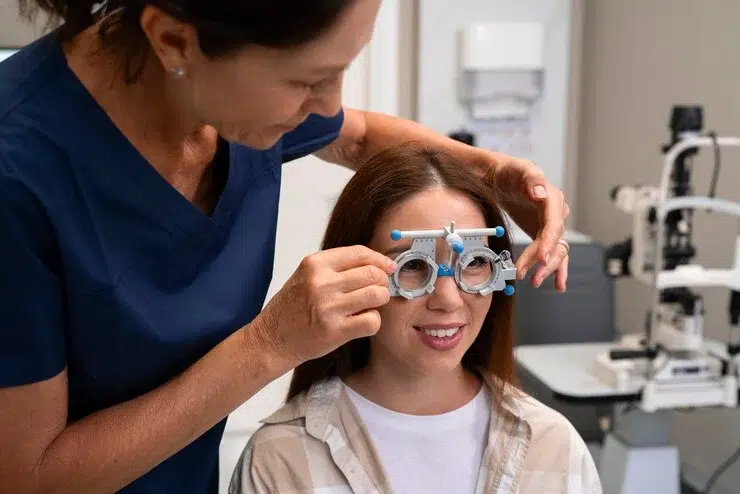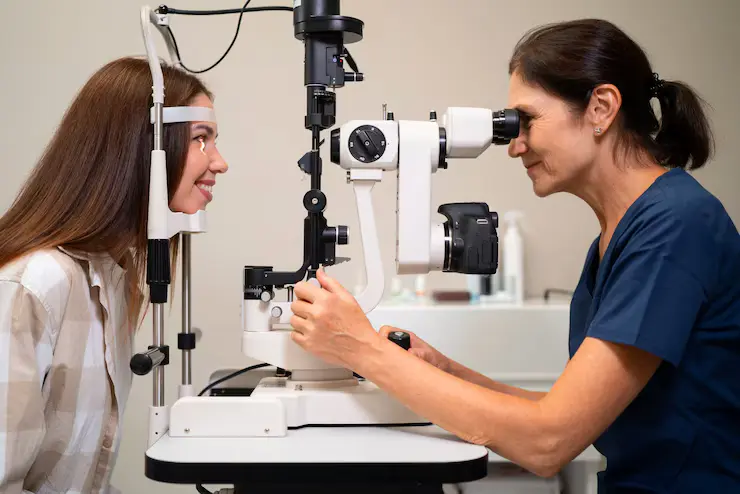The Importance of Optometry: Understanding the Vital Role of Eye Care Professionals
Optometry plays a crucial role in maintaining overall health. As an optometrist, you help people see better and improve their quality of life. Your expertise can detect early signs of serious health issues, such as diabetes and hypertension, through routine eye exams.
Purpose of the Guide: What Readers Will Learn About BSc Optometry
This guide covers everything you need to know about pursuing a BSc in Optometry. You’ll learn about the course structure, admission requirements, best colleges, career opportunities, and much more. Whether you’re a prospective student or just curious about the field, this guide will provide valuable insights.
What is BSc Optometry?
Definition and Overview: What the Degree Entails
A BSc in Optometry is an undergraduate program that prepares you to become a professional optometrist. You will learn how to examine eyes, diagnose visual problems, and prescribe corrective lenses.
History and Evolution: The Development of Optometry as a Profession
Optometry has evolved significantly over the years. From being a trade to becoming a highly respected healthcare profession, the field has grown with advancements in technology and medical research.
Course Structure and Syllabus
Duration of the Program: Typical Length and Phases
Typically, a BSc in Optometry is a four-year program. It includes theoretical coursework, practical labs, and clinical internships.
Core Subjects and Modules
Anatomy and Physiology of the Eye: Key Concepts and Importance
Understanding the structure and function of the eye is fundamental. You will study the anatomy and physiology of the eye in detail.
Optics and Refraction: Fundamental Principles
This module covers the principles of light and how it interacts with the eye. You’ll learn about refraction and how to correct vision problems.
Clinical Optometry: Practical Skills and Knowledge
Clinical Optometry teaches you how to conduct eye exams and diagnose conditions. Practical skills are emphasized through hands-on training.
Ophthalmic Instruments and Equipment: Tools of the Trade
You’ll become proficient with the instruments used in optometry, such as phoropters, retinoscopes, and slit lamps.
Vision Science: Theoretical Underpinnings
Vision Science explores how we perceive visual information. This subject delves into the neurobiology of vision.
Elective Courses: Options for Specialization
Electives allow you to specialize in areas such as pediatric optometry, contact lenses, or ocular diseases.
Admission Requirements
Educational Prerequisites: Necessary Academic Background
You generally need a high school diploma with strong grades in science subjects, particularly biology, chemistry, and physics.
Entrance Examinations: Common Tests and Scoring
Many programs require entrance exams like the NEET or specific optometry entrance tests. High scores improve your chances of admission.
Application Process
Timeline and Deadlines: Important Dates
Applications typically open in the fall, with deadlines in the spring. Check specific dates for each institution.
Documentation Needed: Required Paperwork
You’ll need to submit transcripts, letters of recommendation, and a personal statement.
Best Colleges for BSc Optometry
Top Institutions Worldwide: Renowned Universities and Colleges
- Anna College, Madurai: Known for its excellent optometry program and state-of-the-art facilities.
- Other top institutions include the University of California, Berkeley, and the University of Manchester.
Selection Criteria: Factors to Consider When Choosing a Program
Consider faculty expertise, clinical training opportunities, and campus facilities.
Geographic Distribution: Options in Different Regions
Optometry programs are available worldwide. Research programs in your region or consider studying abroad for a diverse experience.
Online BSc Optometry Degree Programs
Availability and Accessibility: How to Find Online Programs
Some institutions offer hybrid programs combining online coursework with in-person clinical training.
Accreditation: Importance of Recognized Credentials
Ensure the program is accredited by relevant optometry boards or councils.
Pros and Cons: Benefits and Potential Drawbacks
Online programs offer flexibility but may lack the hands-on experience of traditional programs.
Student Life in a BSc Optometry Program
Typical Daily Routine: What to Expect Day-to-Day
Expect a mix of lectures, lab work, and clinical practice. Your schedule will be busy but rewarding.
Academic Workload: Study Hours and Expectations
Be prepared for a rigorous academic workload. Consistent study habits are key to success.
Extracurricular Opportunities: Clubs, Organizations, and Activities
Join optometry clubs and professional organizations to network and enhance your learning.
Clinical Training and Internships
Importance of Practical Experience: Why Hands-On Training Matters
Practical experience is crucial for developing diagnostic and patient care skills.
Types of Clinical Settings: Hospitals, Clinics, and Private Practices
You will train in various settings to gain a broad understanding of optometry practice.
Internship Structure: Timing, Duration, and Expectations
Internships typically occur in the final year and last several months.
Skills Acquired: Competencies Developed Through Clinical Training
You will develop skills in patient examination, diagnosis, and treatment planning.
Scholarships and Funding
Types of Financial Aid: Scholarships, Grants, and Loans
Explore merit-based scholarships, need-based grants, and student loans.
Application Procedures: How to Apply for Financial Support
Submit applications early and ensure you meet all eligibility criteria.
Noteworthy Scholarships: Specific Opportunities for Optometry Students
Look for scholarships from optometry associations and foundations.

Career Opportunities After BSc Optometry
Job Roles and Titles: Various Positions in the Field
Graduates can work as clinical optometrists, researchers, or in academia.
Work Environments: Where Optometrists Can Work
Opportunities exist in hospitals, private practices, and optical retail chains.
Career Advancement: Pathways for Growth and Specialization
Specialize in areas like pediatric optometry or low vision rehabilitation to advance your career.
Job Prospects and Salary
Entry-Level Salaries: What to Expect Starting Out
Entry-level salaries vary by location but are generally competitive.
Factors Affecting Earnings: Location, Experience, and Specialization
Earnings increase with experience and specialization.
Long-Term Salary Potential: Career Earnings Trajectory
Optometry offers strong long-term earning potential and job stability.
BSc Optometry vs. BSc Ophthalmology
Educational Differences: Curriculum Comparisons
Optometry focuses on vision care and corrective lenses, while ophthalmology includes surgical training.
Role and Responsibilities: Different Professional Duties
Optometrists provide primary eye care, while ophthalmologists perform eye surgeries.
Career Pathways: Distinct Opportunities in Each Field
Both fields offer rewarding careers but with different scopes of practice.
Emerging Trends in Optometry
Technological Innovations: Latest Tools and Techniques
Stay updated on advancements like teleoptometry and AI in diagnostics.
Current Research Areas: Key Topics in Optometry Research
Explore cutting-edge research in ocular diseases and vision therapy.
Future Prospects: Predictions for the Future of the Profession
The demand for optometrists is expected to grow, driven by an aging population and increasing eye care needs.
The Impact of Digital Devices on Eye Health
Digital Eye Strain: Causes and Prevention
Learn how to prevent digital eye strain caused by prolonged screen use.
Blue Light Exposure: Effects and Mitigation Strategies
Understand the impact of blue light and ways to protect your eyes.
Role of Optometrists: Addressing Modern Eye Health Issues
Optometrists play a key role in educating patients about digital eye health.
Pediatric Optometry
Special Considerations: Working with Children
Learn techniques for engaging and examining young patients.
Common Pediatric Eye Issues: Identification and Treatment
Identify and treat common conditions like amblyopia and strabismus.
Importance of Early Detection: Long-Term Benefits of Early Eye Care
Early detection of eye problems can significantly improve outcomes.
Geriatric Optometry
Aging and Eye Health: Age-Related Changes and Conditions
Understand how aging affects vision and common age-related conditions.
Common Conditions: Cataracts, Glaucoma, Macular Degeneration
Learn to diagnose and manage these prevalent conditions.
Care Strategies: Effective Management for Elderly Patients
Develop strategies for providing compassionate and effective care to elderly patients.
Vision Therapy
What is Vision Therapy?: Overview and Benefits
Explore how vision therapy helps improve visual skills and processing.
Conditions Treated: Types of Vision Problems Addressed
Treat conditions like binocular vision dysfunction and convergence insufficiency.
Therapy Techniques: Methods Used in Vision Therapy
Learn about techniques like eye exercises and the use of specialized equipment.
Low Vision Rehabilitation
Understanding Low Vision: Definition and Causes
Low vision significantly impairs daily activities despite correction.
Rehabilitation Techniques: Tools and Methods for Helping Patients
Explore tools like magnifiers and adaptive technologies to aid patients.
Role of Optometrists: Providing Support and Improving Quality of Life
Optometrists help patients maximize their remaining vision and maintain independence.
Sports Vision
Enhancing Athletic Performance: Importance of Vision in Sports
Vision is crucial for hand-eye coordination and reaction time in sports.
Assessment Techniques: Evaluating Visual Skills for Athletes
Assess skills like depth perception, peripheral awareness, and eye tracking.
Training Methods: Improving Visual Performance
Use specialized training to enhance athletes’ visual abilities.

Public Health and Optometry
Community Eye Care: Outreach and Public Health Initiatives
Participate in community programs to provide eye care to underserved populations.
Preventive Eye Care: Promoting Regular Screenings and Eye Health Education
Educate the public on the importance of regular eye exams and eye health.
Role of Optometrists in Public Health: Contributions to Community Well-Being
Optometrists contribute to overall health by preventing and managing vision problems.
Continuing Education and Certifications
Lifelong Learning: Importance of Staying Updated
Continual education is essential to stay current with advancements in optometry.
Advanced Certifications: Additional Qualifications and Their Benefits
Consider certifications in specialized areas to enhance your expertise and career opportunities.
Professional Development Opportunities: Conferences, Workshops, and Courses
Attend professional events to network and learn about the latest in optometry.
Conclusion
Recap of Key Points
We’ve covered all aspects of pursuing a BSc in Optometry, from course details to career prospects.
Encouragement to Pursue Optometry: Motivational Closing Remarks
Optometry is a rewarding and impactful career. If you have a passion for eye care, this field offers immense opportunities.
Further Resources: Links to Additional Information and Support
Explore resources such as professional organizations, academic journals, and optometry networks to stay informed and connected.
FAQs
1. What is the scope of BSc Optometry?
Graduates can work in hospitals, clinics, optical retail, private practice, research, academia, and public health. The demand for optometrists is growing.
2. Is BSc Optometry called a doctor?
Optometrists are not typically called “doctors” unless they complete additional qualifications. They are eye care professionals but do not perform surgeries like ophthalmologists.
3. How many years is BSc Optometry?
The program usually takes four years to complete, including both theoretical and practical training.
4. Can I do BSc Optometry after 12th?
Yes, you need a minimum of 50% in the science stream with Physics, Chemistry, Biology, and English as compulsory subjects.
5. Is optometry hard to study?
It is challenging but manageable with dedication. It requires a good grasp of biology, physics, and chemistry, along with practical skills.
6.How to get a job after BSc Optometry?
You can work in hospitals, eye care centers, optical retail chains, or start your own practice. Internships and networking can enhance job prospects.
7. Is NEET required for BSc Optometry?
Generally, NEET is not required. Some institutions may have their own entrance exams.
8. Which is better: B Pharm or BSc Optometry?
It depends on your interests. B Pharm focuses on pharmaceuticals, while BSc Optometry focuses on eye care and vision health.
9. What is the starting salary of B Optometry?
Starting salaries in India range from ₹2.0 Lakhs to ₹5.0 Lakhs per year.
10. What is the difference between B Sc Optometry and B Optometry?
B Optometry and BSc Optometry are two most popular bachelor degree courses in the field of Optometry. While B. Optom is more of a professional course, BSc Optometry is more focused on studying the field theoretically.
